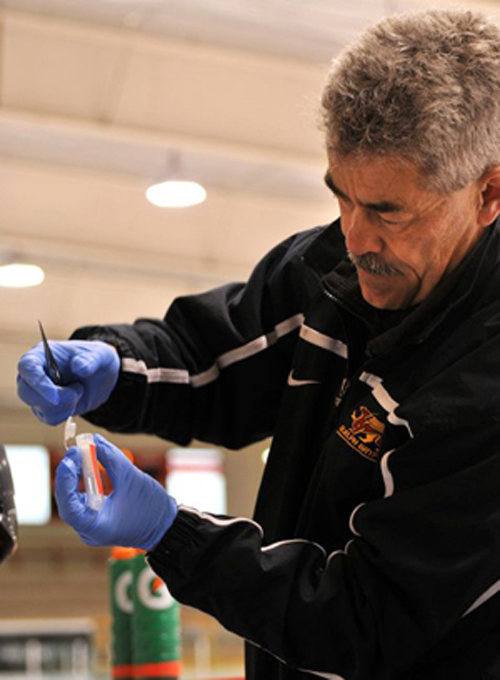
Staying well-hydrated while playing hockey is just as important as wearing the right equipment and sharpened skates, says Prof. Lawrence Spriet, Department of Human Health and Nutritional Sciences.
Previous research has focused on dehydration levels in athletes who play sports in hot weather. Hockey players were often overlooked in these studies because they play in chilled arenas and it was believed that they don’t sweat as much as other athletes.
That theory doesn’t hold water, says Spriet, because hockey is an intense, stop-and-go sport and players sweat as much as or more than athletes who play football, soccer or tennis in hot weather.
“We’re in awe of how hard they work,” he says of the Guelph Storm and World Junior hockey players who took part in his research. Hockey players can lose as much as two per cent of their body mass, equivalent to a 90-kilogram player losing 1.8 litres in fluid.
“You generate a lot of heat, and the body has to work quite hard to dissipate that heat, so it sweats a lot,” he says.
Add heavy equipment to a fast-paced game, and you have a recipe for dehydration. The body cools itself by sweating, but wearing multiple layers of clothing and equipment inhibits the body’s ability to release heat. Excessive sweating can lead to dehydration if those fluids aren’t replaced.
“When you lose fluid, your body has a harder time sending blood to the skin, and that’s how we get the heat to the periphery,” says Spriet. “Water absorbs that heat and dissipates it through sweating. It’s a very efficient system.”
But drinking water isn’t enough to stay hydrated. That’s why it’s important to drink a sports drink that contains both salt, which the body loses through sweating, and sugar, which fuels the brain and muscles.
One to two per cent dehydration is considered mild and won’t cause serious health problems like heat stroke, which can occur at four to six per cent dehydration, but it can impair a player’s performance on the ice by affecting reaction time, decision making and endurance.
Spriet’s research, which is funded by the Gatorade Sports Science Institute of Canada, is aimed at educating hockey players, coaches and trainers on the importance of staying hydrated to achieve optimal performance. His one-minute “infomercials” recently aired during the World Junior Hockey Championship.
In February and March 2010, Spriet and graduate students Matthew Palmer, Mark Linseman and Heather Logan conducted a study on campus involving 16 volunteers who played 70 minutes of scrimmage once a week over an eight-week period. Some of the players experienced a higher heart rate and core temperature at only one per cent dehydration. Their rating of perceived exertion, which refers to how hard they feel they are working, also increased.
“There’s more physiological strain on the body,” says Spriet. “The body does not seem to keep itself as cool.”
Sweat rates vary from person to person depending on their physiology and genetic makeup. People who sweat more lose more salt and become dehydrated faster. Regular physical training also causes the body to adapt by sweating faster and more profusely.
“Even in a well-trained person who is well-adapted to handle the heat that comes with exercise, if you let yourself get dehydrated, it compromises that system,” says Spriet.
But staying hydrated is easier said than done when players get caught up in the game. They need to get into the habit of sipping a sports drink every time they step off the ice, says Spriet. The more time players spend on the ice, the more important it is for them to stay hydrated so they can make it through the game.
One-third of World Junior hockey players Spriet tested were up to two per cent dehydrated. He also tested 20 Guelph Storm players over three games and found they lost an average of 3.5 litres of fluid.
Spriet advises adults to drink 500 to 700 ml of fluid 60 to 90 minutes before exercising. They should continue to drink fluids during their workout to keep their dehydration level below one per cent.